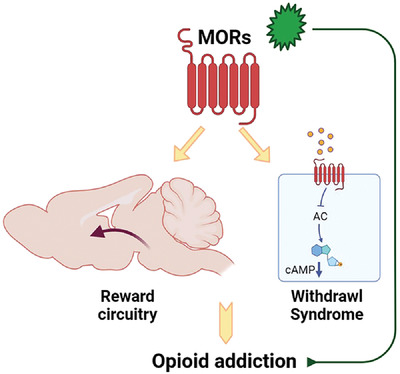MedComm | Mechanism of opioid addiction and its intervention therapy: Focusing on the reward circuitry and mu-opioid receptor

Open the phone and scan
Opioid abuse and addiction have become a global pandemic, posing tremendous health and social burdens. The rewarding effects and the occurrence of withdrawal symptoms are the two mainstays of opioid addiction. Mu-opioid receptors (MORs), a member of opioid receptors, play important roles in opioid addiction, mediating both the rewarding effects of opioids and opioid withdrawal syndrome (OWS). The underlying mechanism of MOR-mediated opioid rewarding effects and withdrawal syndrome is of vital importance to understand the nature of opioid addiction and also provides theoretical basis for targeting MORs to treat drug addiction. In this review, we first briefly introduce the basic concepts of MORs, including their structure, distribution in the nervous system, endogenous ligands, and functional characteristics. We focused on the brain circuitry and molecular mechanism of MORs-mediated opioid reward and withdrawal. The neuroanatomical and functional elements of the neural circuitry of the reward system underlying opioid addiction were thoroughly discussed, and the roles of MOR within the reward circuitry were also elaborated. Furthermore, we interrogated the roles of MORs in OWS, along with the structural basis and molecular adaptions of MORs-mediated withdrawal syndrome. Finally, current treatment strategies for opioid addiction targeting MORs were also presented.
This study summarizes the circuitry of the brain reward system and the progress in the understanding of the role of MORs within the reward circuitry, as well as the roles of MORs in the development of opioid withdrawal symptoms, and briefly reviews current treatment strategies for opioid addiction targeting MORs.

1. Rewarding effects and withdrawal syndrome are two dominant components of opioid addiction .2. Mu-opioid receptors (MORs) are highly involved in reward circuitry and the development of withdrawal syndrome. 3. MORs are important targets to treat addiction and withdrawal syndrome.
Article Access: https://doi.org/10.1002/mco2.148
More about MedComm: https://onlinelibrary.wiley.com/journal/26882663
Looking forward to your contributions.


